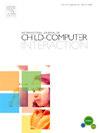Enhancing computational thinking in upper elementary: A two-phase study examining the effect of unplugged activities
Q1 Social Sciences
International Journal of Child-Computer Interaction
Pub Date : 2025-07-18
DOI:10.1016/j.ijcci.2025.100765
引用次数: 0
Abstract
This two-phase study investigated the effect of unplugged activities (UAs) on learning computational thinking (CT) with educational robotics (ERs) of upper elementary school students. In Phase 1, we conducted a case study, using multiple sources of qualitative data to identify challenges students encountered in learning CT with ERs. We found that children often failed to explicitly program robot behaviors, had difficulties shifting between allocentric and egocentric reference frames, and understanding the ‘flow of control’. Based on these findings, we developed UAs to help students practicing task decomposition, identifying patterns in tasks, and applying abstraction and algorithmic thinking. In Phase 2, we tested the effects of the UAs in a quasi-experimental study conducted in a summer school. The results show that UAs targeting students' challenges significantly improved their learning of CT skills and programming. We discuss our approach and findings in relation to developing practical intervention designs for teachers and curriculum developers.
提高小学高年级的计算思维:一项两阶段的研究,考察了不插电活动的效果
本研究分为两个阶段,探讨了不插电活动对小学高年级学生使用教育机器人学习计算思维(CT)的影响。在第一阶段,我们进行了一个案例研究,使用多种来源的定性数据来确定学生在与急诊室一起学习CT时遇到的挑战。我们发现,孩子们经常无法明确地对机器人行为进行编程,难以在非中心和自我中心的参考框架之间转换,也难以理解“控制流程”。基于这些发现,我们开发了ua来帮助学生练习任务分解,识别任务中的模式,以及应用抽象和算法思维。在第二阶段,我们在暑期学校进行的一项准实验研究中测试了UAs的效果。结果表明,针对学生挑战的ua显著提高了他们对CT技能和编程的学习。我们讨论了为教师和课程开发者开发实际干预设计的方法和发现。
本文章由计算机程序翻译,如有差异,请以英文原文为准。
求助全文
约1分钟内获得全文
求助全文
来源期刊

International Journal of Child-Computer Interaction
Social Sciences-Education
CiteScore
7.20
自引率
0.00%
发文量
73
 求助内容:
求助内容: 应助结果提醒方式:
应助结果提醒方式:


